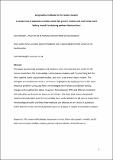Longitudinal methods for life course research : a comparison of sequence analysis, latent class growth models, and multi-state event history models for studying partnership transitions
Abstract
This paper qualitatively compares and contrasts three methods that are useful for life course researchers; the more widely used sequence analysis, and the promising but less often applied latent class growth models, and multi-state event history models. The strengths and weaknesses of each method are highlighted by applying them to the same empirical problem. Using data from the Norwegian Generations and Gender Survey, changes in the partnership status of women born between 1955 and 1964 are modelled, with education as the primary covariate of interest. We show that latent class growth models and multi-state event history models are a useful addition to life course researchers’ methodological toolkit and that these methods can address certain research questions better than the more commonly applied sequence analysis or simple event history analysis.
Citation
Mikolai , J & Lyons-Amos , M 2017 , ' Longitudinal methods for life course research : a comparison of sequence analysis, latent class growth models, and multi-state event history models for studying partnership transitions ' , Longitudinal and Life Course Studies , vol. 8 , no. 2 , pp. 191-208 . https://doi.org/10.14301/llcs.v8i2.415
Publication
Longitudinal and Life Course Studies
Status
Peer reviewed
Type
Journal article
Description
Júlia Mikolai was a PhD student at the Department of Social Statistics and Demography at the University of Southampton and was funded by a +3 Scholarship provided by the Economic and Social Research Council (ES/J500161/1) while completing most of this work.Collections
Items in the St Andrews Research Repository are protected by copyright, with all rights reserved, unless otherwise indicated.

